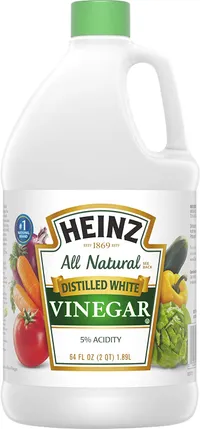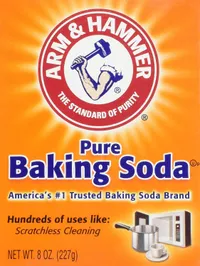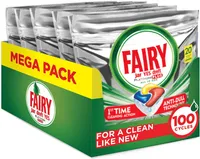How to clean a dishwasher according to experts
Experts weigh in on 4 of the best ways to clean a dishwasher inside. The right way to clean your appliance with vinegar and baking soda plus, when it is okay to use bleach and other common questions answered.

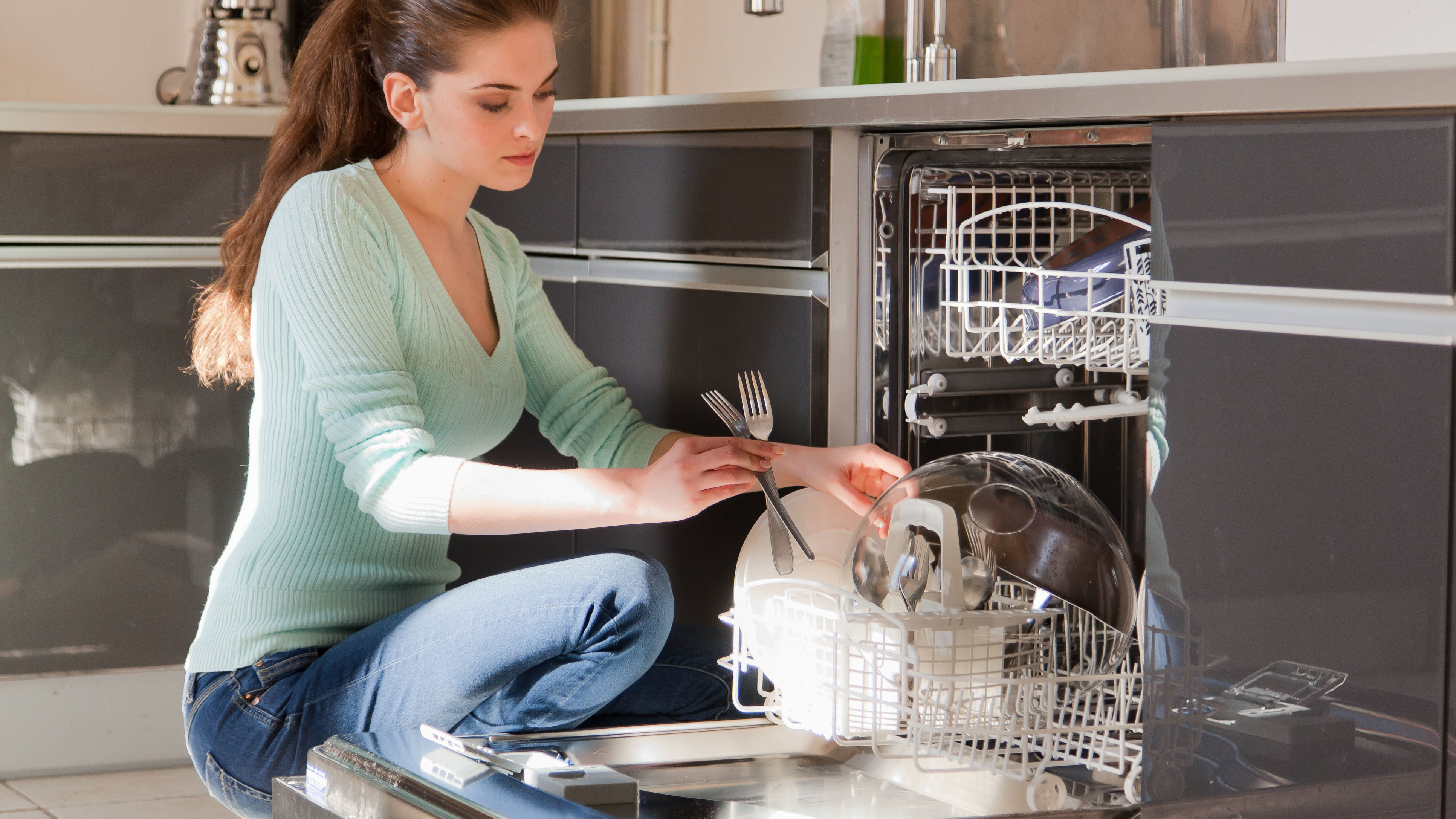
Knowing how to clean a dishwasher properly is essential to ensure this hardworking kitchen appliance stays fit for purpose. We often forget to clean those everyday items that also work at cleaning things... But a dishwasher should not be forgotten and if yours has started to smell or is not bringing out the same shine in your dinnerware over time, it could be feeling neglected.
There are a few different ways to tackle this household chore. Some swear by cleaning a dishwasher with vinegar, some like baking soda, others prefer to use bleach to get rid of germs, mold and more, while many households will choose commercial dishwasher cleaning products. The best method depends on your appliance and on your preferences. We asked the experts to talk us through their favorite ways so that you can make an informed decision that will keep your best dishwasher working hard.
Paul Moody, Founder of Pro Mover Reviews and home and cleaning expert says, 'It’s important to clean the dishwasher because over time, food debris, soap scum, and grease build-up, which reduce the efficiency of the appliance. Plus, it serves as a breeding ground for germs, so it messes up the hygiene and poses a health risk.'
Derek Chiu and Leslie Tam, Co-Founders and Directors of UrbanMop, an affordable and reliable cleaning service business add 'You definitely need to clean your dishwasher in order to make your wash better.'
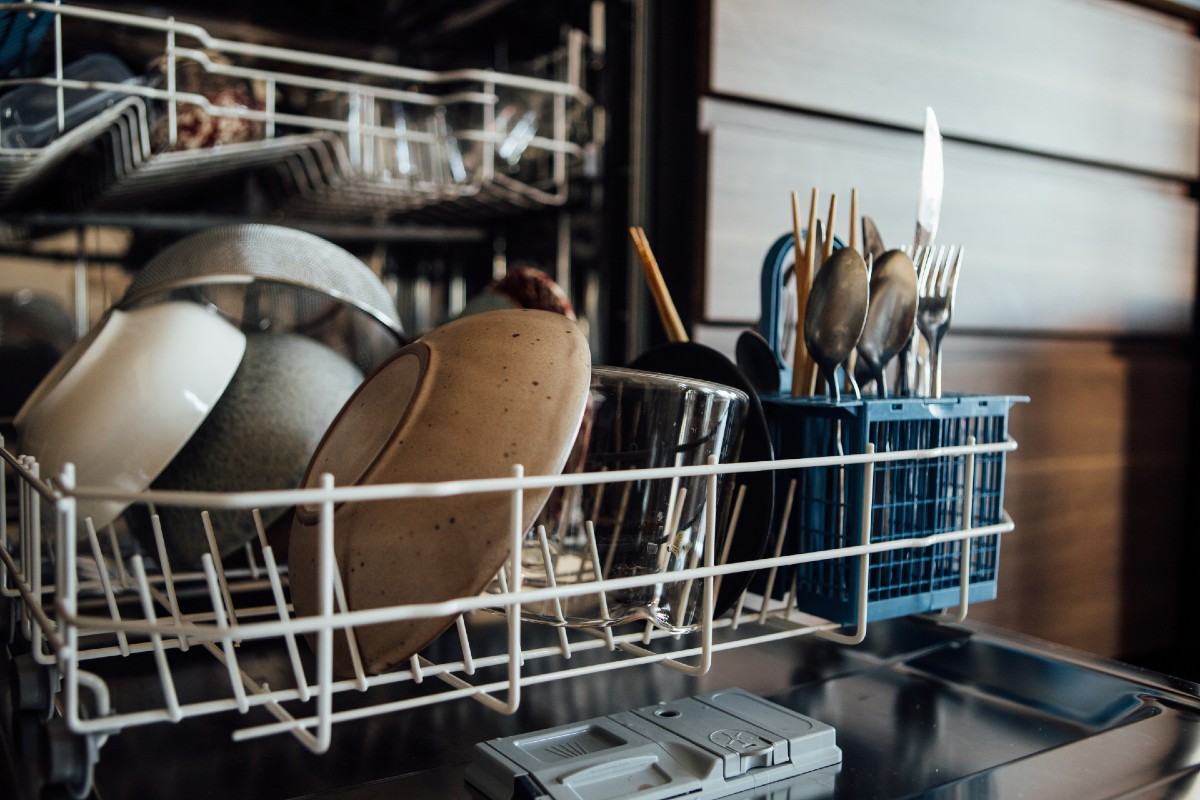
How often should you clean a dishwasher?
Navas Magne, a writer at Appliances For Life shares, 'The dishwasher is one of the most essential appliances in the house if you don’t love to wash the dishes manually. The appliance is perfect for every modern home because it allows people to spend quality time on other things rather than spending too much time fulfilling their domestic obligations.
If you have a dishwasher, even the best slimline dishwashers, the question of whether or not you need to clean it should not be up for discussion. Instead, it should be about how often you need to clean it because it directly or indirectly affects your general well-being as the machine is the one you’ll use to clean your dishes. If you leave your dishwasher for a long time without washing it, soap scum, grease, and food debris will build up, reducing the efficiency of the machine. It’s imperative to regularly clean your dishwasher if you want it to keep performing at the highest level.'
To keep your dishwasher running efficiently, there are different areas you should tackle on a daily, weekly or monthly basis. Experts at Smeg say 'Cleaning the filter in your dishwasher's base regularly is crucial. This collects food particles and residues and can not only produce an odour if not cleaned but will also reduce the dishwasher's performance.'
Get small space home decor ideas, celeb inspiration, DIY tips and more, straight to your inbox!
'You should also remove the spray arms every once in a while and clean these separately, allowing you to remove fruit pips and small food particles that may have got caught in the jets during the cycle. To give the dishwasher a thorough clean, you can purchase a dishwasher cleaner which removes both grease and odours, however a few wedges of lemon added to the cutlery basket or tray will help to freshen up the dishwasher.'
Daily: Pull out the bottom dishwasher rack and check around the filter area to pick up any trapped food on a daily basis. Removing those food bits will stop them from clogging up your filter and causing bad smells. Also check for lodged utensils also that could stop the dishwasher spray arm from spinning correctly.
Weekly: You should then clean you dishwasher filter and the door on a weekly basis to keep your dishwasher clean and in check. Because if your dishwasher filter and the area around it isn't clean, then nothing else will be. We'd also recommend tackling the build up of grime around the dishwasher door and control buttons.
Note that if you use your dishwasher a lot, you may need to consider full cleanses more often like when you clean a kitchen.
What's the best way to clean the inside of a dishwasher?
From natural solutions to bleach, bringing the shine back to your appliance is easily done.
You will need:
- White vinegar/Baking soda/A commercial cleaning product/Bleach/Lemon
- Rubber gloves
- A scrubbing sponge
- Old toothbrush
1. How to clean a dishwasher with vinegar
To clean the inside of a dishwasher with vinegar. You'll need to do start by emptying the dishwasher. Then, place 250ml of white vinegar in a dishwasher-safe container on the top rack. Or, pour the solution into the bottom of the dishwasher. Set the temperature to the highest heat level and run for a full cycle. Using vinegar mixed with hot water will disinfect everything and wash away any grease and grime and remove musty odours.
2. How to clean a dishwasher with baking soda
Simply sprinkle a few tablespoons of baking soda on the bottom of the machine. The run your dishwasher on a short cycle at the highest temperature.
You can do this after cleaning your dishwasher with vinegar also, to freshen it up even more and get rid of any lingering smells.
Can you clean a dishwasher with vinegar and baking soda together?
Moody notes that while you can use both these natural ingredients separately, it's best not to combine them when cleaning a dishwasher. 'Yes, you can clean a dishwasher with vinegar and baking soda, but in separate cycles. If you mix them together, it will generate a lot of foam which will create an additional mess to clean up.'
'Place the dishwasher safe-bowl at the bottom of the empty dishwasher and fill it up with a cup of white vinegar. Next, run a hot water cycle and the vinegar will break down any remaining soap scum, residue, grease, and bits of food. After this cycle ends, remove the safe bowl and sprinkle some baking soda at the bottom of the dishwasher. Run a short cycle and the baking soda will leave your dishwasher smelling fresh and stain-free.'
Chiu and Tam add how 'You can clean the dishwasher with vinegar and baking soda. The vinegar will be used to stip away the grease build-up, and the baking soda can be used to remove the lingering odors in the machine. You should not put them both in the same cycle as it will foam up and create a mess in the dishwasher.'
Magne agrees: 'Vinegar and baking soda are two of the world’s most powerful cleansers. Both cleansers are often combined to combat tougher stains, but sadly, you can’t do the same when cleaning your dishwasher. You can’t mix vinegar and baking soda in the same cleaning cycle because they’re too powerful and may damage the machine. You can run a cleaning cycle with vinegar to help dissolve any grease build-up in the machine before running a cup of baking soda on the inside floor of the dishwasher.'
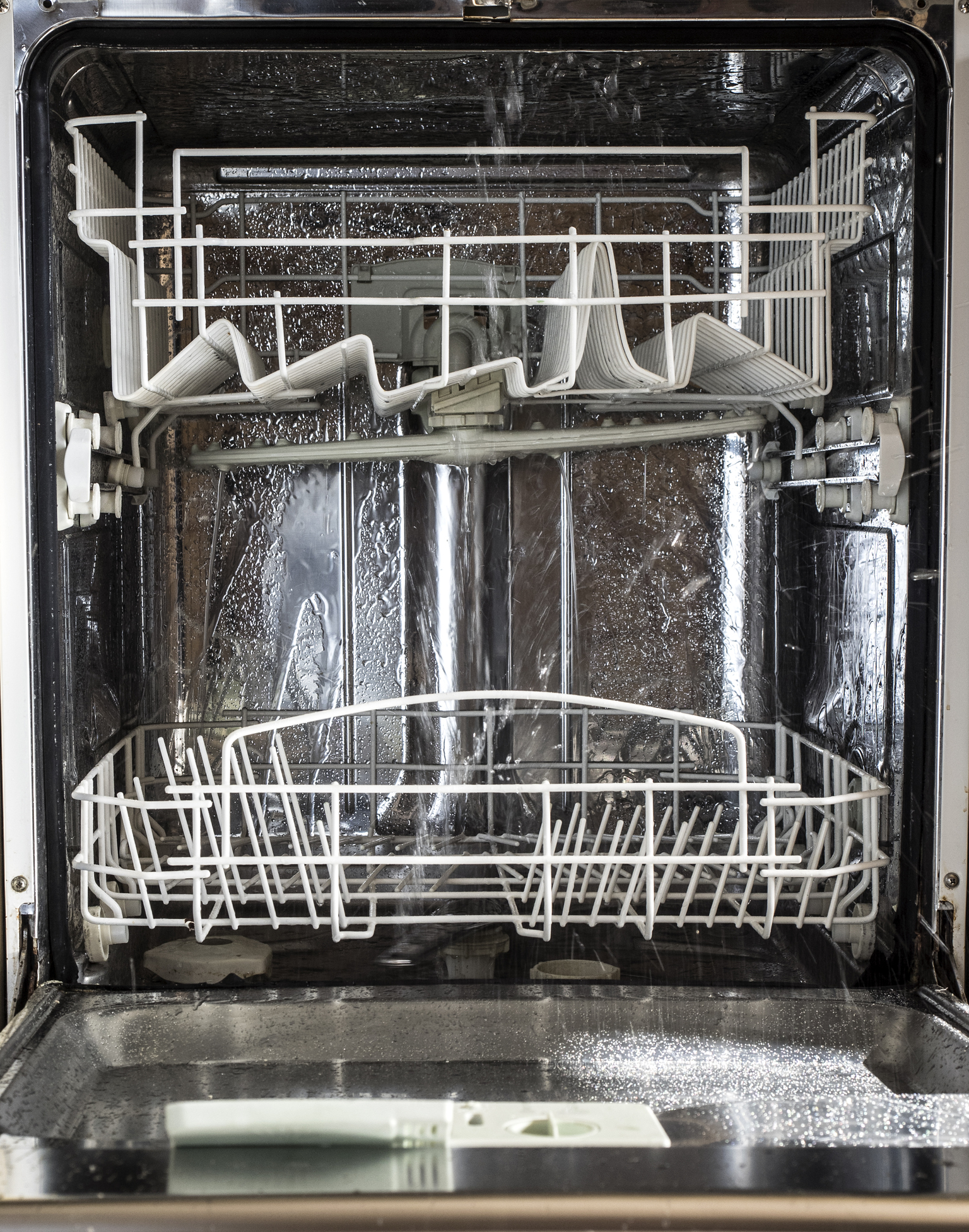
3. How to clean a dishwasher with bleach
Using bleach to clean a dishwasher is a bit of a grey area as bleach or harsh cleaners can apparently damage the seals and dishwasher itself over time. This is what the experts think:
Andre Kazimierski, CEO, Improovy notes that, 'As long as your dishwasher doesn’t contain any stainless steel parts, bleach is a great option for cleaning. Using bleach in your dishwasher can deep clean the interior and remove tough stains, mold, and mildew. To do so, pour one cup of bleach into a dishwasher and bleach-safe bowl and place it on the top rack of your dishwasher. Run a full wash cycle without the drying step. As a reminder, only use bleach by itself. Do not mix in baking soda or vinegar.'
Moody adds 'Bleach is safe to use in dishwashers that come with a plastic finish or if they’re labelled as "bleach safe".If the surface has stainless steel, it can cause corrosion and damage. So, limit using bleach on plastic surfaces only once or twice a month.'
Chiu and Tam add, 'You can clean a dishwasher with bleach only if the dishwasher is not stainless steel and does not contain stainless steel. Using bleach can deep clean the inside of the dishwasher to remove stains and mildew. You can clean the dishwasher by pouring a cup of bleach in a dishwasher and bleach safe bowl and placing it on the top rack of your dishwasher.
Magne echoes, 'Bleach is also very effective in removing tough stains, mildew, and mold. However, you should not use bleach with your dishwasher if it’s stainless steel.'
4. How to clean a dishwasher with lemon
Either place a dishwasher safe bowl with lemon juice, or both halves of a lemon on the top rack of your machine. Then run it on a normal cycle, with or without dishes. This is a great way to lightly disinfect the inside of your dishwasher, and to help keep it smelling fresh also. Lemon will even add a shine to your dishes if you leave them in on the wash cycle.
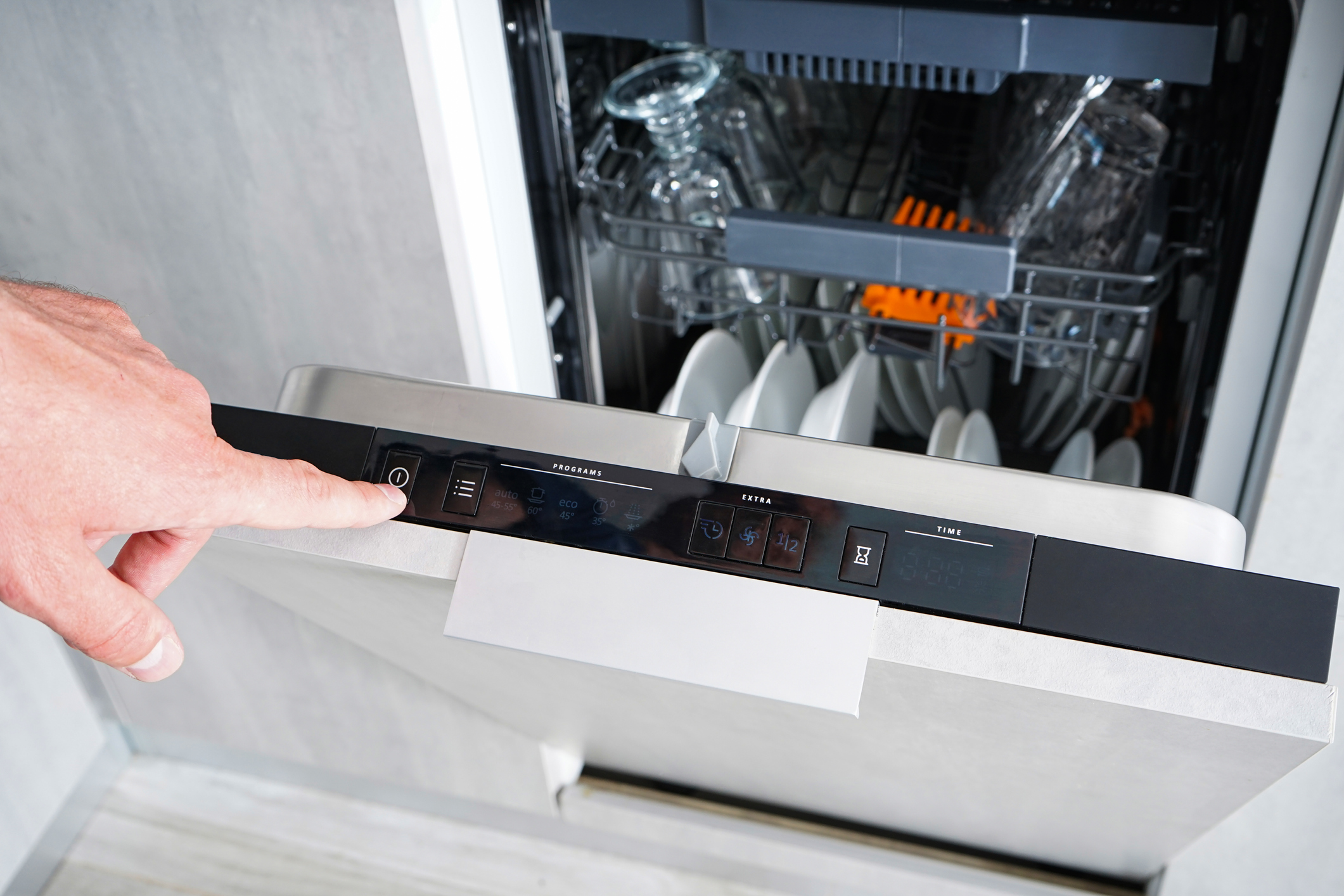
How to deep clean a dishwasher
For a thorough monthly dishwasher cleanse you should remove any parts and clean the outside to, the order you do this in isn't so important. Chiu and Tam add, 'First of all, you need to be sure that the filter is clean as the food particles tend to get caught. Next, give the filter a clean by rinsing it with warm water and dish soap and scrubbing it with the toothbrush. Be sure to give the dishwasher seal a good clean by scrubbing it and wiping it down with cold water. Finally, you should also occasionally de-clog the sprayers from the food particles using a toothpick.'
The Real Homes method is to remove the racks and utensil holder and wash them with hot water. Then dip an old toothbrush in the soapy water and scrub to remove any stubborn marks. Gently scrub the spray arm (this is the propeller like arm that cleans the dishes), and poke any debris or limescale through the holes with a toothpick and scrub with a sponge scourer. Rinse this under a tap and replace it.
You should then clean the dishwasher filter by removing the lower tray, looking inside and locating the drain, then cleaning all around it. Pull the filter out and remove any chunks of food that have been left behind. Rinse and wash the filter thoroughly with hot water, using a soft toothbrush to remove any stubborn grease, and replace it. Finally, spray a little white vinegar over the drain. This will help keep it clean between washes.
Next for your dishwasher door, use a multi-purpose cleaner or warm, soapy water to wipe away all fingerprints, grease or food residue from the dishwasher door. Then dry thoroughly with a soft cloth or piece of kitchen towel. Clean around the dishwasher buttons with a damp cloth – moving in the direction of the grain if you're cleaning stainless steel – as too much water could cause damage. Clean door seals thoroughly to get rid of mold and mildew, as this will eventually damage the seals and could cause the dishwasher to leak. And finally, gently brush the sides of the doors and around the edges with a small toothbrush.
To finish off your deep dishwasher clean, follow with the vinegar and baking soda methods listed above.
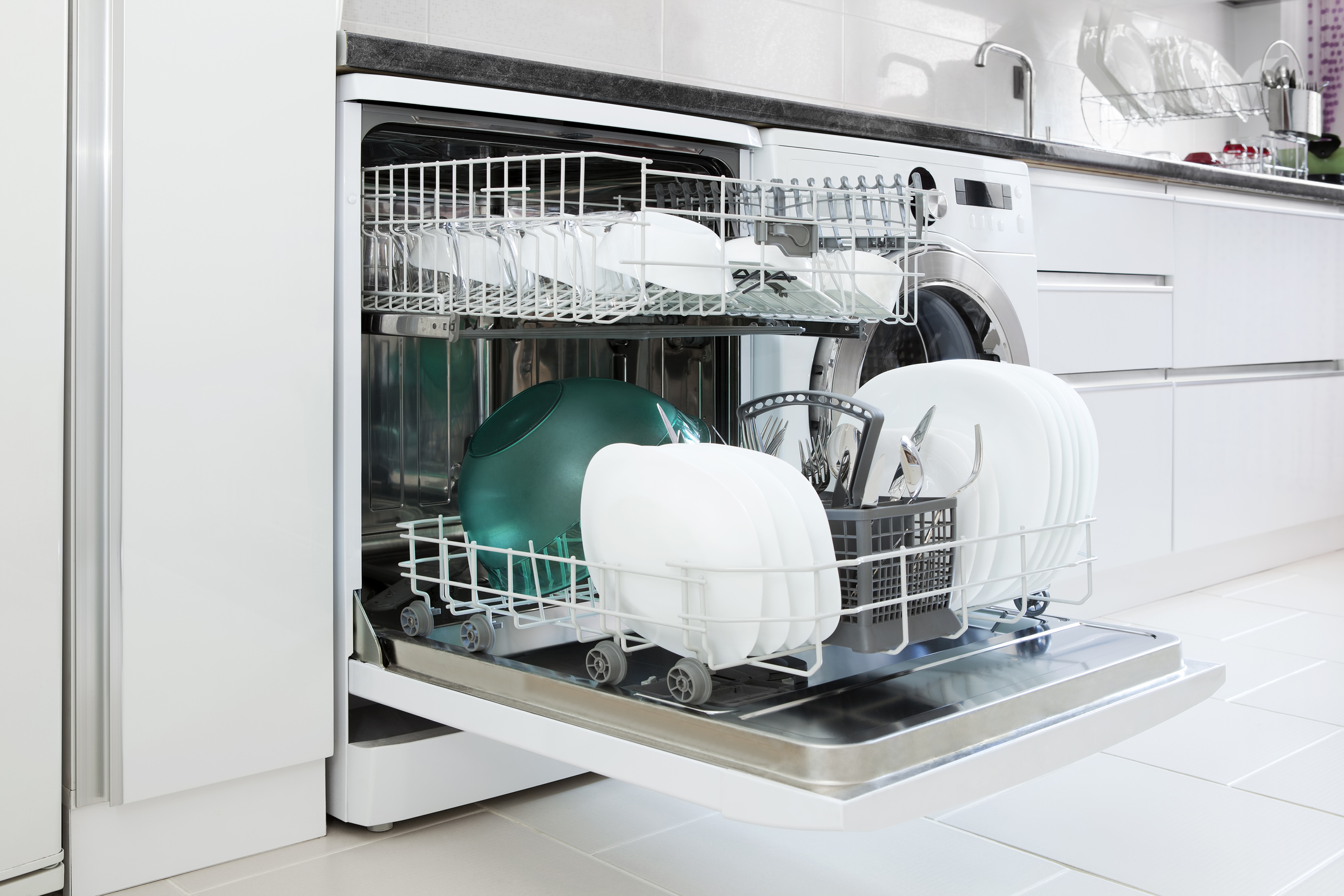
How do you keep a dishwasher clean?
- Scrape any excess food off plates, pots and pans before they go into the dishwasher.
- Don't overfill your dishwasher as this will make it less efficient and the water won't have room to circulate. The same applies to cutlery.
- Clean your dishwasher filters regularly.
- Keep dishwasher salt and rinse aid topped up to stop limescale building up and to soften the water.
- Use the right setting, don’t use an economy setting if the load is really dirty and needs a hot wash.
How to deal with a smelly dishwasher
Running your dishwasher on a hot wash once every month will stop it smelling, and it's worth doing this if you use the eco or cool wash programme during the rest of the month as these washes might be eco-friendly, but they allow food residue to build up more readily.
If you're still getting unpleasant smells from your dishwasher – or worse, bits of food that seem to come from absolutely nowhere – you may be dealing with a waste blockage, or the waste pipe is bent out of shape, restricting the flow of waste water. You'll need to switch off and pull out the device to inspect. If the waste pipe is bent, you may want not to push the dishwasher back in all the way.
How to descale a dishwasher
You could go with the branded cleaner from your dishwasher manufacturer, or a proprietary cleaner, but if you’re after a store cupboard solution for limescale build up, then try cleaning with vinegar. Fill a large dishwasher-proof cup with the liquid, add it to the top basket, and run a cycle without detergent (or any dishes, of course).
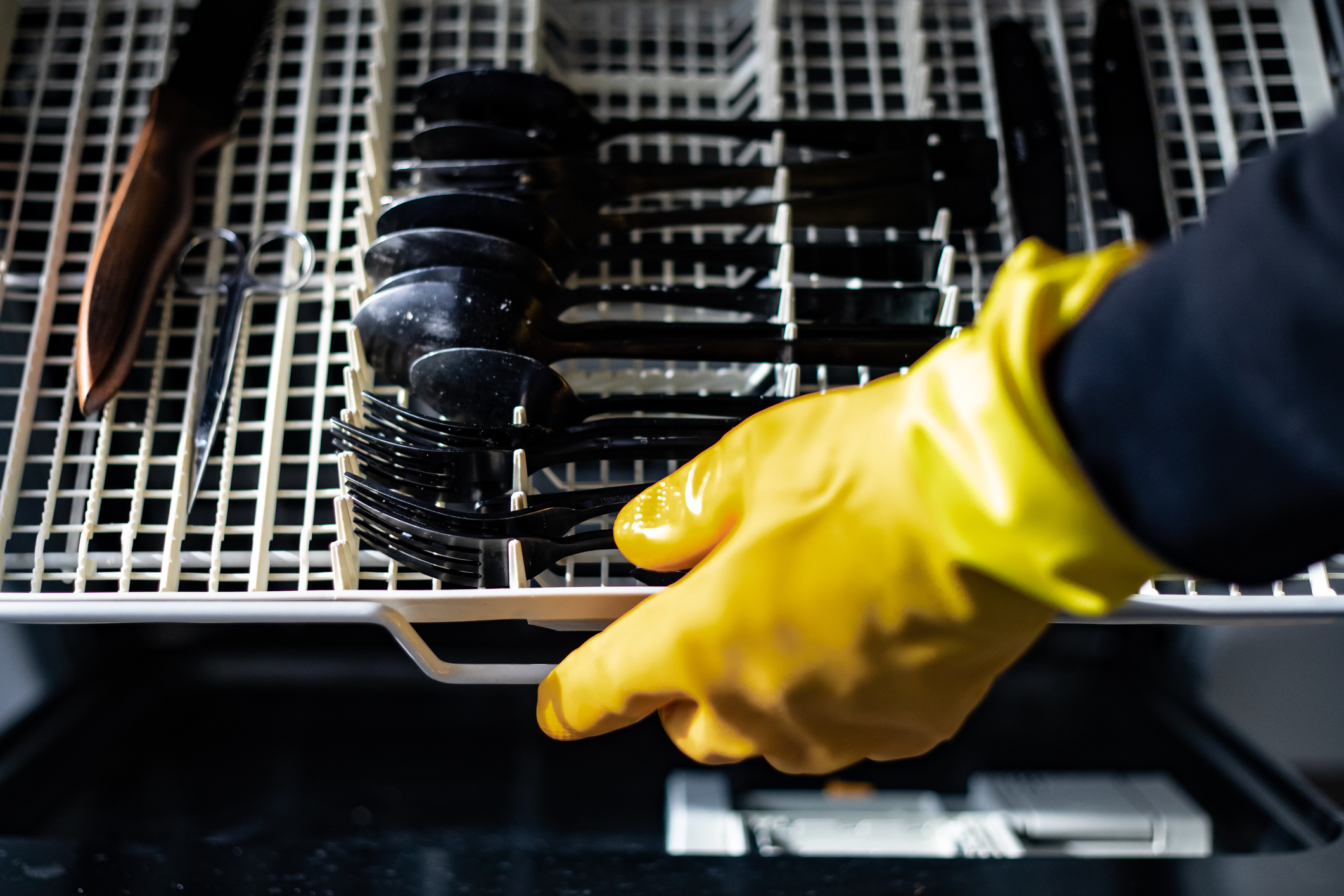
Dishwasher salt – what is does and why it's important
What does dishwasher salt do?
Dishwasher salt helps your dishwasher run properly, by softening the water which helps your dishwasher detergent dissolve more effectively for better and more sparkling clean results.
Simply fill up the dedicated salt unit, being careful to not let the salt sit anywhere else in your dishwasher as it won't run properly and could leave your dishes with a salty residue.
Can you use regular salt instead of dishwasher salt?
As tempting as it may be, don't do it. Regular cooking salt isn't suitable for dishwashers as it contains anti-caking agents which can clog up your appliance.
Do you need dishwasher salt and rinse aid?
Dishwasher salt and rinse aid do different things. Rinse aid does what it says on the can, it helps the water run off your dishes more easily for streak-free results. If your water is particularly hard or you’re noticing a film on your clean dishes, a rinse aid is a necessary addition.
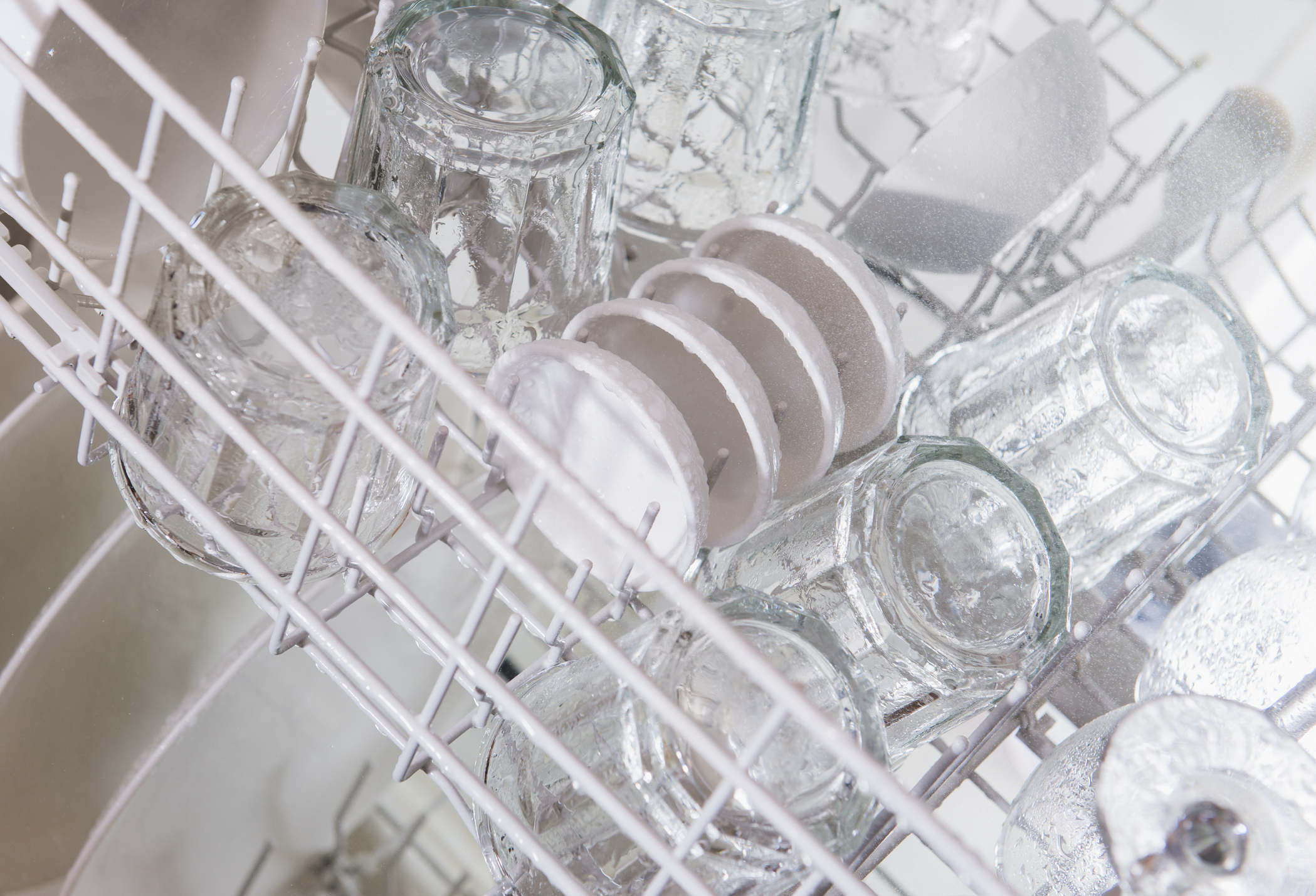
Can I use vinegar as a dishwasher rinse aid alternative?
You might be tempted to use vinegar as a rinse aid for your dishes as well as for cleaning your dishwasher, but it's not recommended.
Some natural cleaning hacks may suggest using white vinegar in lieu of a pricey rinse aid, but resist this idea. Vinegar is very acidic, so it can break rubber gaskets and hoses if used too often. Plus, it can mix with salt from your food and discolor metal flatware or pans.
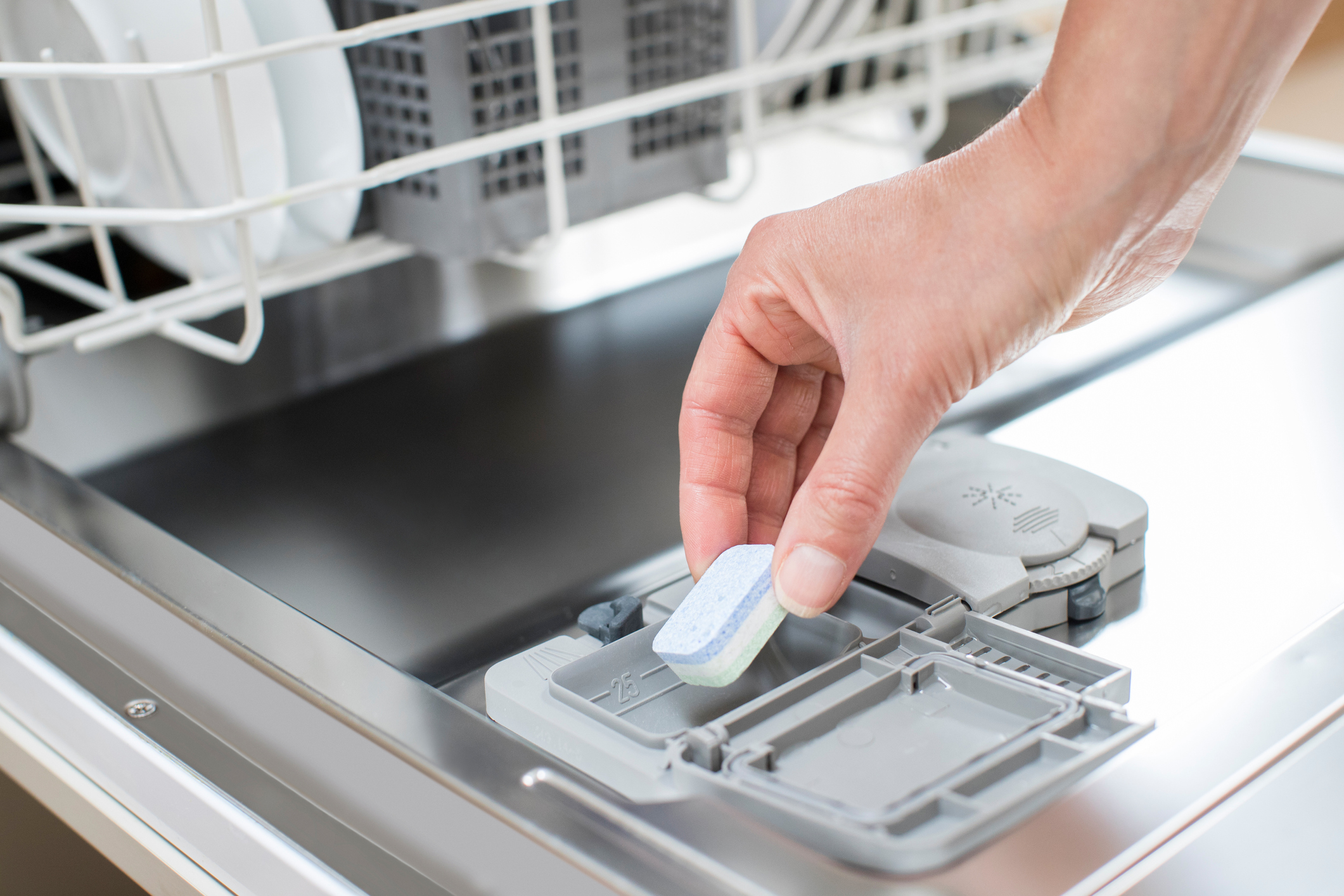
What's a good commercial dishwasher cleaning product?
If you don’t want to clean using vinegar as a deep cleaning agent for your dishwasher, you can buy a cleaning product, such as Dr Beckmann Service It Deep Clean.
Make sure you read the instructions in full before use and wear rubber gloves. Simply follow the instructions on the packet and pour all the powder directly into the bottom of the empty dishwasher and run cycle as normal, every week.
Can I use a washing machine cleaner in my dishwasher?
Much like you can use a dishwasher to clean other weird and wonderful things, you may be tempted to use another appliance cleaning product in your dishwasher too. But our advice is: unless the product is specifically labelled as being suitable for dishwashers, avoid using it.
One of the potential problems with using a different cleaning product in the dishwasher is that it may foam too much, making your dishwasher unable to drain off the froth. Some newer dishwashers will then activate an anti-flood device that can only be deactivated by draining the dishwasher manually.
Never, ever use dishwashing liquid in the dishwasher for this reason, or laundry detergent. If you don't want to spend too much money on different products, Ecozone make washing machine and dishwasher cleaner tablets suitable for both appliances.
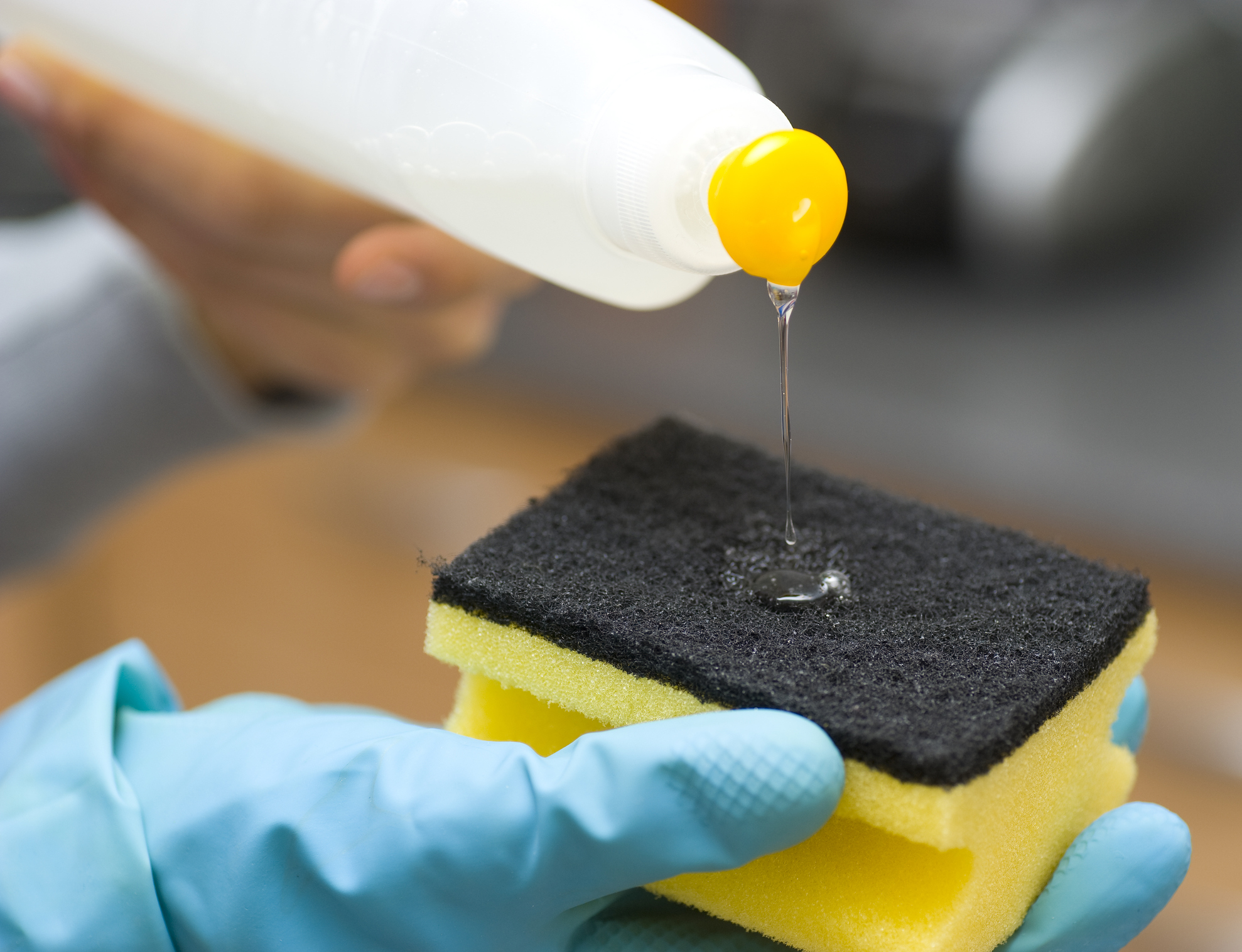
Expert tips on how to clean a dishwasher
You only learn from the best, and so here are some words of wisdom from our favorite house-proud names.
Martha Stewart's dishwasher cleaning tip
When cleaning brown stains often as a result of calcium or iron buildup, Martha Stewart suggests: 'use citric acid... Empty the dishwasher, fill the detergent cup with citric acid, and run a complete cycle. Run the dishwasher through a second cycle without the crystals but with detergent.'
Mrs Hinch's dishwasher cleaning tip
When it comes to commercial dishwasher cleaning products, beloved Sophie Hinchliffe swears by 'the Fairy platinum plus all-in-one, that's all I use' as it lessens the need to soak dishes before loading the dishwasher. Find them on Amazon.
Lynsey Crombie's – AKA The Queen of Clean – dishwasher cleaning tip
Lynsey Crombie largely uses our method as above, and when it comes to cleaning the exterior of your machine she recommends: 'Wipe down all your seals and around the door with a solution of 50% white vinegar, 20% neat lemon juice and 30% water.'
'I put the solution in a spray bottle as it can be used for other household cleaning jobs. I use Lemon juice as this leaves a fresh clean smell and lemons are also great for breaking down dirt and grim.'
Shop Heinz All-Natural Distilled White Vinegar - White Vinegar for Cleaning, Pickling, and Cooking, 1.89 Litre from Amazon
A must for natural cleaning around the kitchen and beyond.
Shop Fairy Platinum Plus Dishwasher Tablets Bulk, Lemon, 100 Tablets, Best Tough Food Cleaning That Leaves Your Dishes Shiny Clean Like New from Amazon
Mrs Hinche's favorite dishwasher tablet.
Now dishwasher duty will be a dream!
